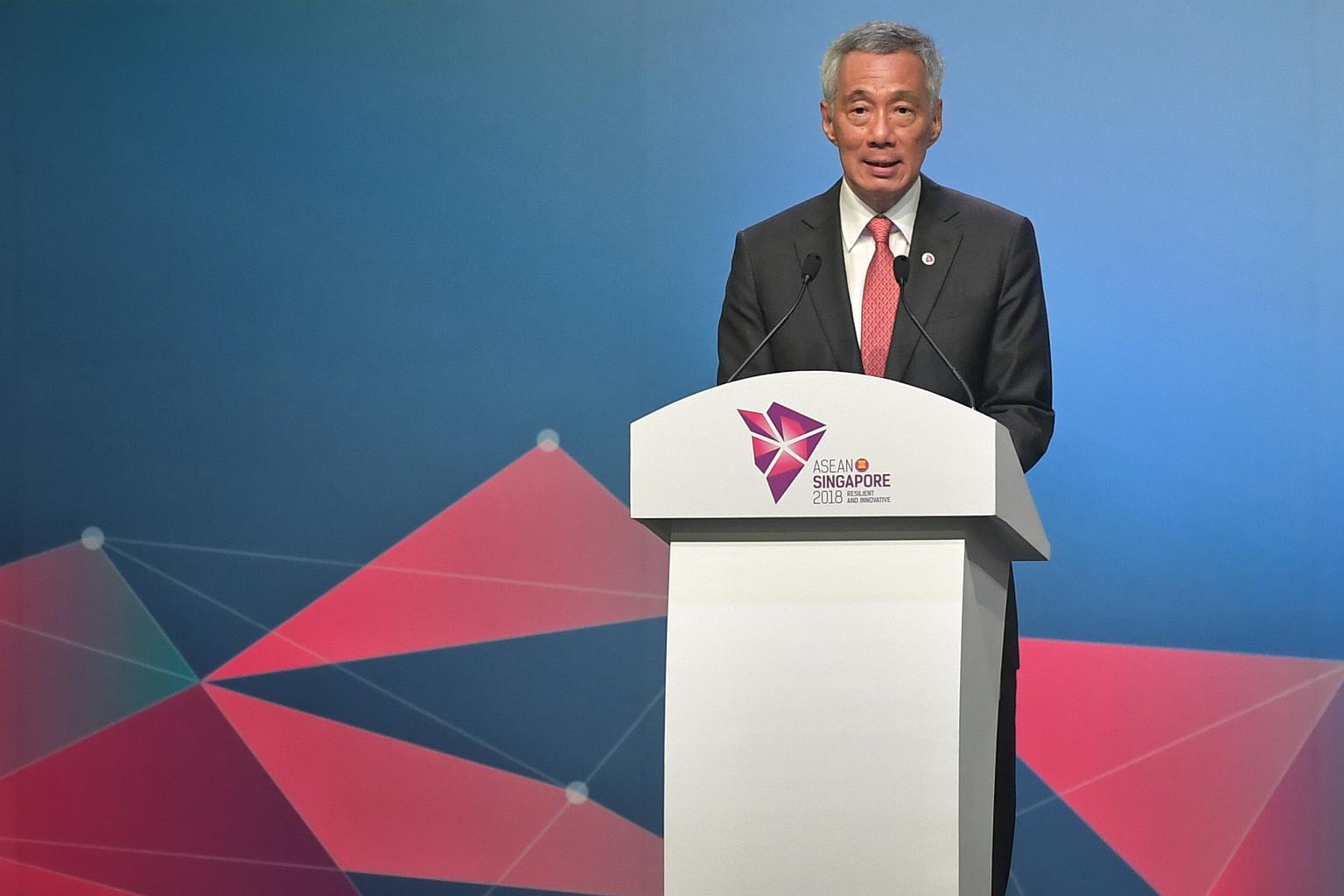33rd Asean Summit: PM's 3 questions for members to consider on strengthening Asean
Boosting region requires effort that goes beyond national interests, says PM Lee
Sign up now: Get ST's newsletters delivered to your inbox

Prime Minister Lee Hsien Loong noted that last month, Asean defence ministers adopted the world's first multilateral air guidelines aimed at managing unintentional encounters between military aircraft.
ST PHOTO: KUA CHEE SIONG
Strengthening Asean is an ongoing, multi-year project that requires a forward-looking effort that goes beyond national interests, Prime Minister Lee Hsien Loong said.
Addressing fellow leaders from all 10 South-east Asian countries at yesterday's plenary session of the 33rd Asean Summit, which followed a working dinner, PM Lee outlined three broad areas to work on.
One, collectively strengthen the Asean-centric frameworks that keep the region open and inclusive.
Two, increase intra-Asean trade and build connections between Asean businesses to deepen economic integration.
Three, despite their diversity and differences, members should uphold the consensus-based decision-making model and keep Asean united, relevant and effective.
"There is still much more for Asean to achieve, and as Singa-pore completes our chairman-ship, we look forward to working with fellow Asean members and like-minded partners to streng-then Asean," he told the closed-door session.
In remarks released to the media, he elaborated on three questions he had raised for his counterparts from the region to consider.
ONE: How can they lay the foundation for a more peaceful, secure and rules-based region?
"We have to continue building trust and confidence in our neighbourhood. We especially need to minimise the risk of conflict by accident," PM Lee said.
He noted that last month, Asean defence ministers adopted the world's first multilateral air guidelines aimed at managing unintentional encounters between military aircraft.
Asean has also acted to address non-traditional risks, adopting a statement on cyber-security cooperation in April, and agreeing to subscribe in principle to voluntary, non-binding norms of state behaviour in cyberspace in September.
Law ministers have also endorsed a model extradition pact and tasked officials to start work on the Asean Extradition Treaty.
Defence officials also enhanced regional counter-terrorism cooperation and held a symposium on countering terrorism collectively.
PM Lee said: "Underlying these efforts is the recognition that no one country can bring about a secure, peaceful and rules-based region; collaboration is fundamental."
TWO: How can Asean remain vibrant and dynamic to seize new opportunities?
"We have strengthened economic integration across borders," PM Lee said, citing the Asean Single Window, Asean-wide self-certification and the Asean e-commerce agreement inked on Monday.
"Tremendous progress has been made this year towards completing the RCEP negotiations," he added, citing the Regional Comprehensive Economic Partnership trade pact that Asean is negotiating with six key partners.
"There is some work ahead to finalise the remaining details, but we are now close to the finishing line."
The Asean Smart Cities Network also links the region's cities with external partners to generate new ideas on smart and sustainable urbanisation, he added.
THREE: How can Asean speak in one collective voice on regional developments and global issues?
Asean leaders will meet the leaders of their key partners this week, and PM Lee said it was "important that we remain united and cohesive, especially on issues where our partners have differing views".
First, the South China Sea remains a potential flashpoint.
But he was heartened that Asean and China have made good progress on the Code of Conduct and attained a single draft text on which to negotiate the code.
"The negotiations will not be easy, but it is important that Asean continues to speak in one voice on shared principles: Respect for the freedom of navigation and overflight, self-restraint including non-militarisation, and peaceful resolution of disputes in accordance with international law."
Second, tensions have abated in the Korean peninsula, but it is a long journey towards denuclearisation. He welcomed the three inter-Korean summits as well as the United States-North Korea summit in June, adding that Singapore is committed to fully implementing United Nations Security Council resolutions and will continue to work with the international community to support regional peace.
Third, the humanitarian situation in Myanmar's Rakhine State is a concern. PM Lee acknowledged it is a complex issue that leaders need to discuss with Myanmar as a member of the Asean family.
Bangladesh and Myanmar have agreed to begin the first batch of repatriations of Rohingya refugees in a few days' time. About 700,000 of them fled their homeland following a military crackdown that began in August last year.
"We hope this will be a step forward on the voluntary return of displaced persons to Myanmar in a safe, secure and dignified way, and in alleviating the humanitarian situation of displaced persons," he said.
"We support the Myanmar government's commitment to fully implement the recommendations of the Kofi Annan commission. We also look forward to the full implementation of the MOU with UN agencies to facilitate repatriation."
PM Lee noted that Myanmar has set up an Independent Commission of Enquiry on human rights violations.
"Asean is ready to play an active and positive role in the situation, and will support efforts by all parties to work towards a comprehensive and durable solution," he said.


